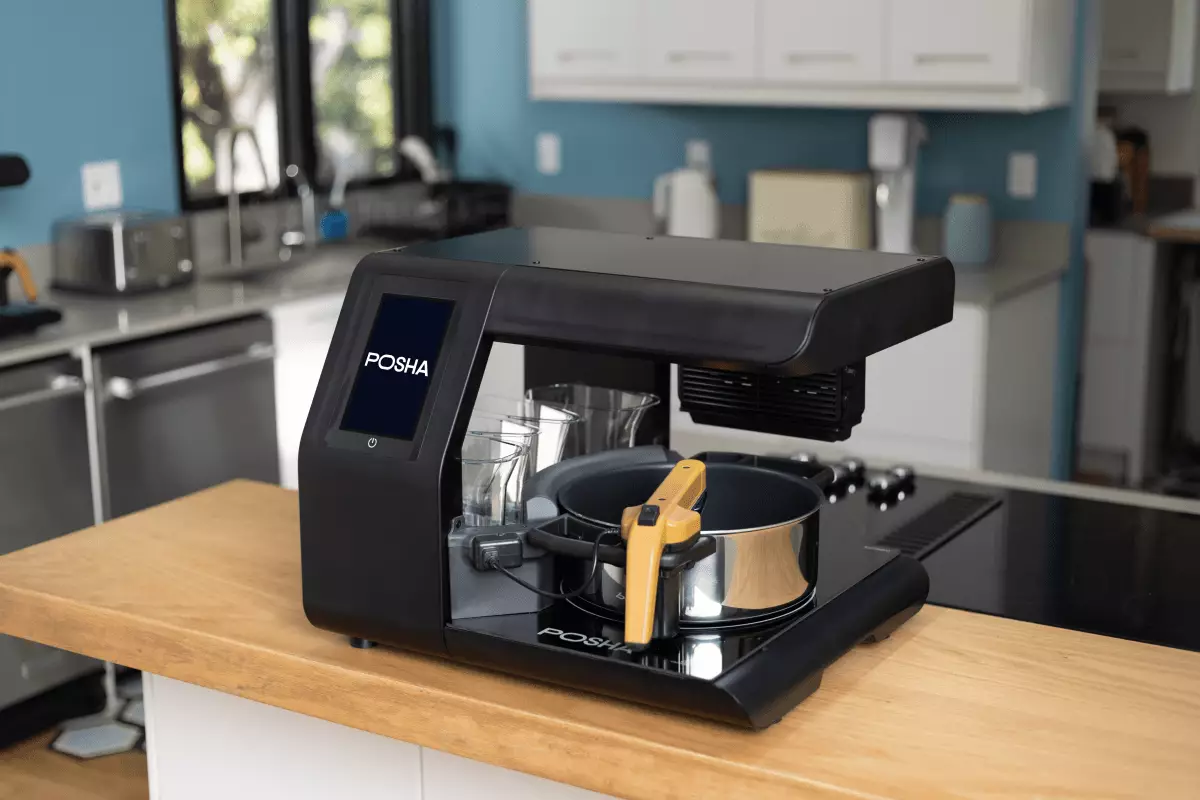In a world where convenience often supersedes tradition, Raghav Gupta’s journey exemplifies the blend of personal need and entrepreneurial spirit. In 2017, he sought a solution to the modern dilemma of home cooking—how to enjoy the flavors from childhood without sinking hours into the kitchen or shelling out significant money on takeout. Thus, Posha was born—a culinary innovation backed by robotics and computer vision aimed at revolutionizing home meal preparation. Gupta’s endeavor challenges the norm, suggesting that a modern kitchen doesn’t just need appliances; it needs smart technology that understands and caters to its users.
As a participant in TechCrunch’s Startup Battlefield, Posha has pioneered countertop robots designed to automate meal preparation. Users can browse through an array of recipes, select their desired meal, and with a simple input of ingredients, the machine takes charge of cooking. This level of automation makes meal preparation accessible and less daunting, especially for those who dread the labor involved in ingredient shopping, preparation, and cooking. Gupta’s commitment to user-friendly functionality is evident; he emphasizes customization and adaptability as core features of Posha, allowing for ingredient substitutions which further enhances the device’s convenience.
The Balance Between Automation and Human Touch
While Posha simplifies cooking, it’s crucial to recognize that it doesn’t entirely eliminate human involvement. Unlike a traditional coffee machine, which requires minimal effort beyond adding ingredients, Posha demands a bit more from its users. Shopping for fresh vegetables, pre-cutting, and measuring ingredients still falls on consumers. Gupta acknowledges this dichotomy, suggesting that users who appreciate cooking but yearn for a little respite are the ones most inclined to adopt this technology.
This unique positioning is both a strength and a potential drawback. While some consumers relish the hands-on aspect of cooking, others may be deterred by the need to still participate actively. Posha effectively targets the sweet spot in the market: those who want to lighten their kitchen workload rather than eliminate it entirely.
The pitch is enticing; Gupta articulates how Posha could help users save an impressive 70% of their time spent in the kitchen. Users who typically spent an hour or more each day preparing meals would find themselves with an additional 40 to 50 minutes, quite possibly transforming their daily routines. This automation not only frees up time but also allows users to repurpose that time toward relaxation or family engagement, signaling a broader shift in how technology influences our culinary habits.
Iterative Learning through Customer Engagement
Posha’s evolution has been shaped by a keen attention to customer feedback. Originally branded as Nymble, the startup shifted its focus after engaging with users who expressed preferences against complex appliances that might disrupt their kitchen dynamics. Gupta’s commitment to understanding the consumer experience is profound; the startup interacts with customers via WhatsApp rather than conventional customer service platforms. This method not only positions Gupta as a familiar face among users but fosters trust and loyalty, indispensable for any start-up trying to carve out a niche.
While the informal communication style might not be scalable in the long term, it has evidently built a strong rapport with early adopters. Early conversations yielded insights that helped refine the product, emphasizing Posha’s reliability and user friendliness—two traits that spur word-of-mouth marketing, which has been one of the startup’s most effective promotional tools.
The Future of Cooking is Here
The innovative essence of Posha extends beyond time-saving preparation; it taps into the rapidly advancing field of artificial intelligence. With an impressive $8 million Series A backing, Gupta aims to harness these funds for expanding the variety of recipes available and incorporating user-generated suggestions. The goal is to integrate generative AI that can interpret recipe ideas and convert them into actionable cooking instructions seamlessly.
Gupta believes that Posha, like other essential kitchen appliances of the past, will become indispensable in homes over time. Invoking nostalgia by comparing the device to microwaves and dishwashers, he suggests a future where human intervention in basic cooking tasks becomes a thing of the past. The initial launch in January 2025 saw sell-outs of its first batch, and pre-orders for the next showcase a market readiness for this novel approach to home cooking.
In an age defined by technology, where efficiency is king, Posha represents an evolution of cooking practices that promise to blend the warmth of home-cooked meals with the precision of modern technology. As consumers increasingly turn to such innovations, they not only crave convenience but also seek to maintain a connection to the meals that have shaped their lives. With Posha, the marriage of tradition and tech looks promising—redefining our kitchens one meal at a time.

